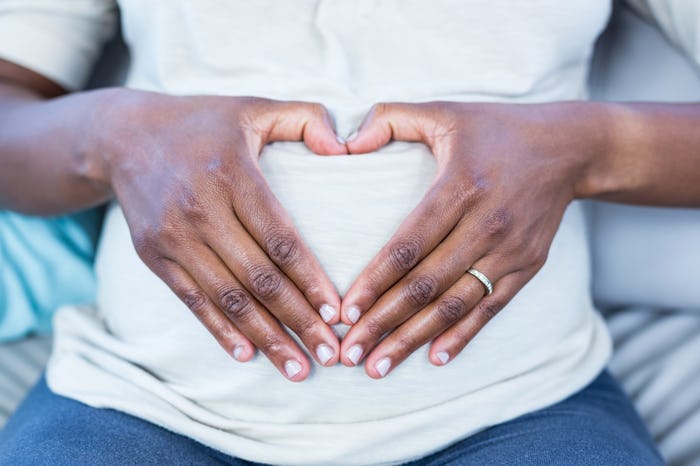News

This Mom Died After Giving Birth At The Hospital, & It’s A Heartbreaking Reminder
It's typical to worry about a number of things when you're pregnant for the first time, but with all the technological and medical advances that exist today, dying in childbirth doesn't often seem like it should be one. In most cases, it's totally fair to expect that you'll simply grow a big belly, get super uncomfortable, go into labor, push the baby out, then bring them home. In reality, however, is that the maternal mortality rate in the United States is disturbingly high, particularly if you're a black woman. That's why, after this mom died right after giving birth at the hospital, her loved ones have started peaking out about maternal deaths, most of which are largely preventable.
In a recent article published as part of the investigative series "Mothers Matter," NBC news affiliate 11Alive in Atlanta revisited the heartbreaking story of 39-year-old mom Kira Johnson, who died from a postpartum hemorrhage in 2016 and less than 12 hours after welcoming her second child. Kira and her husband, Charles Johnson, had no reason to suspect that their son's birth would be anything other than a happy event: their first pregnancy had been complication-free, and Charles told the outlet that his wife was admitted to hospital for her scheduled C-section in "excellent health."
By all account the delivery itself seemed to go well: their baby boy, Langston, was born healthy, and after the delivery Kira and Charles had the opportunity to introduce him to his 19-month-old big brother, Charles Johnson V. But not long after, Charles began to notice that his wife was struggling — Kira was in a lot of pain and had begun to shake, and there was blood in her catheter.
Charles told 11Alive that he "waited for hours" to get help for his wife, even though "he repeatedly asked the medical staff for help." Seven hours later, doctors took Kira away to "fix the problem," according to Charles, only to find out that Kira had been bleeding internally. Her heart stopped before they could help her.
In Aug. 2017, Charles and his mother, TV judge Glenda Hatchett, spoke to People and explained that they learned after Kira's death that she'd hemorrhaged from a lacerated bladder that occurred during her C-section. In March 2017, Charles sued the hospital, Cedars-Sinai Medical Center, for medical malpractice, and though the hospital did not immediately respond to Romper's request for comment, in a statement to 11Alive, a Cedars-Sinai rep called Kira's death "a tragedy," writing:
Cedars-Sinai strongly agrees with Mr. Johnson and the American College of Obstetricians and Gynecologists that no mother should die giving birth.
While federal privacy laws prevent us from responding directly about any patient’s care without written authorization, we can share the following: One of the reasons for Cedars-Sinai’s high quality of care is that we thoroughly investigate any situation where there are concerns about a patient’s medical care. Based on our findings, we make any changes that are needed so that we can continue to provide the highest quality care to our patients. This includes reviewing hospital procedures as well as the competency of healthcare providers.
The issue, though, appears to be much more far-reaching than simply one hospital's policy or procedures. Maternal mortality is a major concern in the United States — according to a joint investigation by NPR and ProPublica, more women die from pregnancy-related complications in the United States than in any other developed country. The United States is also the only country where the mortality rate has actually been increasing. And the numbers are significant: where maternal mortality rates range anywhere from 3.8 deaths per 100,000 live births in Finland to around 9 deaths per 100,000 live births in the U.K., Portugal, and Germany, the mortality rate in the United States as of 2015 is actually a whopping 26.4.
And according to the Centers for Disease Control and Prevention (CDC), black women are actually three to four times more likely to die from pregnancy-related complications compared to white women.
The issue is one that has at times been explained as being a matter of socioeconomics — perhaps, for example, the problem is that low-income black women aren't able to access proper prenatal care. But the data shows that the racial disparity isn't really about money: according to The New York Times, not only are infants born to black parents twice as likely to die compared to those born to white parents, "a black woman with an advanced degree is more likely to lose her baby than a white woman with less than an eighth-grade education."
As for black mothers? Despite being some of the richest celebrities in the world, both Beyoncé and Serena Williams have opened up about experiencing serious complications during childbirth, showing that even women with access to the best healthcare money can buy aren't immune. Beyoncé, for example, suffered from preeclampsia, a potentially deadly condition that disproportionately affects black women. According to The New York Times, pre-eclampsia and eclampsia are 60 percent more common in African-American women.
Williams, on the other hand, suffered a pulmonary embolism, a large hematoma in her abdomen, and a C-section wound that ripped as a result of coughing fits caused by the blood clot, according to The Washington Post. When she finally made it home with her daughter, she had to spent six weeks in bed recovering from the ordeal.
Though Charles Johnson has now been left to raise his two sons without his wife, Kira's death has led him and his mother to launch 4Kira4Moms, a campaign meant to advocate for improved maternal health care for women in the United States. Given the data surrounding maternal mortality, it's clear that greater awareness — and legislation — is definitely needed. Yet it also seems clear that there is still an incredibly long way to go to close the healthcare gap that exists for black women.